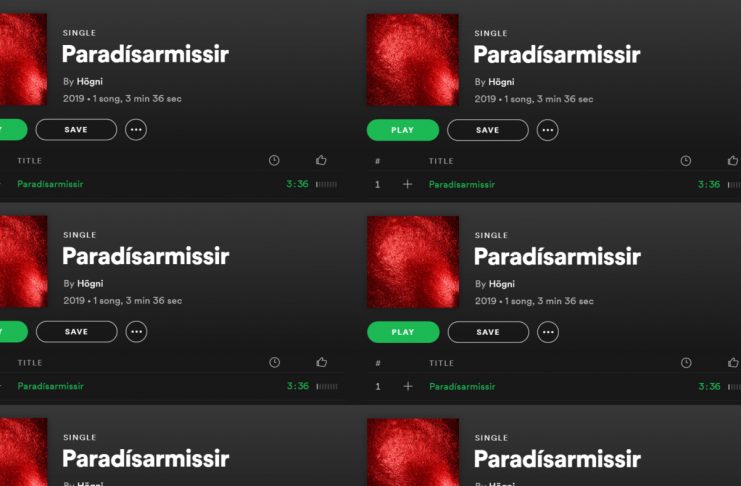SKE English
It’s a rather bizarre story, how Högni came to write the song Paradísarmissir („Paradise Lost“), which he first performed in 2017, and that finally found its way onto Spotify this morning.
In honor of the song’s official release, we’ve recounted the story behind the song here below:
Having been commissioned to compose the theme song to RÚV’s documentary series Paradísarheimt (Paradise Reclaimed), Högni, a notorious procrastinator, or so it would seem, had left himself only a single day to compose and record the song. He was to be on a flight abroad the following morning.
Arriving at RÚV’s headquarters at 10 A.M. on a Friday morning, he came empty-handed, but was convinced, as if by some mystical intuition, that it would be there—in that veritable „wonderland of cultural production“ (his own words)—that he would, at last, finish the song.
He rendezvoused with audio engineer Hjörtur (who would later record the song), and together the pair visited RÚV’s in-house library. Given the series’ title, Högni thought of perusing Laxness’ Paradise Reclaimed for inspiration. But the novel wasn’t right. Paradise Reclaimed is about an Icelandic farmer who moves to Utah in search of the promised land but discovers that it’s a fool’s errand; while the series itself is about individuals suffering from mental illness (there is, perhaps, no clear connection between the two).
Heeding, once again, the thin whisper of intuition, Högni had the idea of phoning up Bókin—a vintage bookstore located in downtown Reykjavík—for he recalled, mistakenly, that the Icelandic poet Dagur Sigurðsson (like Laxness) had published a book entitled Paradise Reclaimed. Inquiring about the collection to the sales clerk, the man responded, in a rather abrupt tone, that no such collection existed.
„No, no, no, Dagur didn’t write Paradise Reclaimed, you’re probably thinking of Milton.“
„Who … Milton?“
„Yes, you’re thinking of Paradise Lost by John Milton.“
The clerk pointed Högni to a translation of Milton’s poem Paradise Lost by Icelandic priest and poet Jón Þorláksson (one of Iceland’s most esteemed translators), but admitted that the translation was not available at Bókin, which was how Högni wound up at Iceland’s National Library.
Upon his return to RÚV—Þorláksson’s translation of Paradise Lost in hand—Högni crossed paths with journalist and writer Eiríkur Guðmundsson, and entreated him to help adapt some part of the poem to his as yet unwritten song:
„Eiríkur, you must help me with this poem! I’ve got this tome of poems by Milton—and we must make Paradise Lost! We must find Paradise Lost!“
Whether it was the urgency in Högni’s voice that persuaded him or the sheer oddness of the request, Eiríkur acquiesced, and together the two of them adapted parts of the old poem to Högni’s song. It didn’t take too long, apparently.
The song Paradísarmissir itself is beautiful—one listener once commented: „No song has inspired such a multitude of feelings. Bravo, just bravo“—but it’s knowing which parts of the poem Högni and Eiríkur appropriated that lends the song even greater resonance. The one line that immediately stands out, and serves as a kind of final refrain (the song’s structure is unconventional by pop standards), is borrowed verbatim from Jón Þorláksson’s poem:
„Ekkert er mér yndælt utan þín!“
Þorláksson’s line is a translation of Eve’s speech to Adam: When Eve tells Adam that while the world, God’s divine creation, is indeed delightful and wondrous, such a thing is only true because she is sharing it with him:
But neither breath of Morn when she ascends
With charm of earliest Birds, nor rising Sun
On this delightful land, nor herb, fruit, floure,
Glistring with dew, nor fragrance after showers,
Nor grateful Evening mild, nor silent Night
With this her solemn Bird, nor walk by Moon,
Or glittering Starr-light without thee is sweet.
Paradise Lost by John Milton is a sweeping affair: the story of the Fall of Man, the temptation of Adam and Eve by Satan, and their expulsion from the Garden of Eden. Högni’s Paradísarmissir, on the other hand, hones in on Adam and Eve’s love story, and reminds us that the treasures of the world would be meaningless—were it not for our ability to share it with our loved ones (if our interpretation holds).
Both Milton’s original poem and Þorláksson’s translation are available online.
https://www.gutenberg.org/files…
https://books.google.is/books?…
You can here Högni tell the story in his own words, in Icelandic, by clicking the link below.

